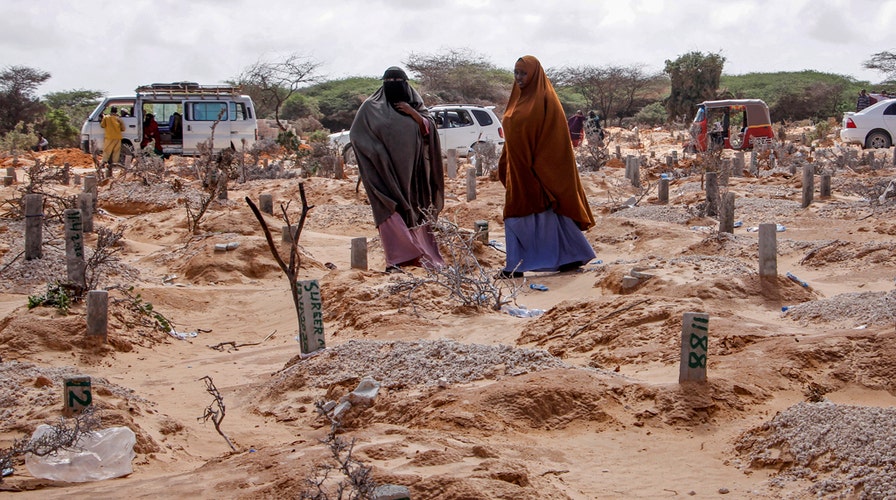Fox News Flash top headlines for May 20
Fox News Flash top headlines are here. Check out what's clicking on Foxnews.com.
Get all the latest news on coronavirus and more delivered daily to your inbox. Sign up here.
Somalia has witnessed a “massive” rise in female genital mutilation (FGM) as girls are kept home from school due to lockdown restrictions during the coronavirus pandemic, a report said Monday.
The charity Plan International, which advocates for children’s rights and equal opportunities for girls, said so-called circumcisers are going door to door offering to cut girls unable to venture outside.
The lockdown, which coincided with the Muslim month of Ramadan, when the ritual is traditionally performed, has undermined efforts to eradicate the practice in Somalia. About 98 percent of women and girls there already have undergone FGM, the highest rate in the world, the charity said.
CLICK HERE FOR FULL CORONAVIRUS COVERAGE

In this photo taken May 13, women walk past graves at a cemetery in Mogadishu, Somalia, following the burial of a man who died of coronavirus. Years of conflict, instability and poverty have left Somalia ill-equipped to handle a health crisis like the coronavirus pandemic. ItÕs uncertain how many cases of COVID-19 are in Somalia. (AP Photo/Farah Abdi Warsameh)
"We've seen a massive increase in recent weeks," Sadia Allin, Plan International's head of mission in Somalia, told the Thomas Reuters Foundation. "We want the government to ensure FGM is included in all COVID responses."
FGM includes many different rituals and usually varies by ethnic group. The most severe form, called infibulation – the practice of excising the clitoris and labia of a girl or woman and stitching together the edges of the vulva to prevent sexual intercourse – is carried out mostly in the northeastern region of Africa in Djibouti, Eritrea, Ethiopia, Somalia and Sudan.
Somali parents have taken advantage of school closures amid the pandemic, asking nurses to perform FGM on their daughters now when they have time to stay home to recover. Allin, who herself has been cut and has two daughters, ages 5 and 9, said circumcisers have been more aggressive in promoting their business amid the economic downturn caused by the pandemic.
"The cutters have been knocking on doors, including mine, asking if there are young girls they can cut. I was so shocked," Allin said. “FGM is one of the most extreme manifestations of violence against girls and women. It's a lifetime torture for girls. The pain continues until the girl goes to the grave. It impacts her education, ambition ... everything.”
The United Nations Population Fund (UNFPA) predicts about 290,000 girls in Somalia will be subjected to FGM in the year 2020. Advocacy efforts to raise awareness about the dangers of the practice in local communities have been stifled by the lockdown.
CLICK HERE TO GET THE FOX NEWS APP
UNFPA Somalia representative Anders Thomsen said global efforts to eradicate the practice also have been sidelined to focus on the coronavirus crisis, meaning an additional 2 million girls worldwide could be cut in the next decade.
Thomsen said that although Somalia is “ground zero for FGM,” he sees some glimmers of hope that the practice will die down due to influence from neighboring Sudan, where the practice recently was criminalized. Data also suggest Somalia families have switched from infibulation to less severe forms of the ritual.
The World Health Organization estimates roughly 200 million women and girls alive today have undergone some form of female genital mutilation. The practice has been documented in more than 30 countries mostly in Africa, as well as in the Middle East and Asia.

